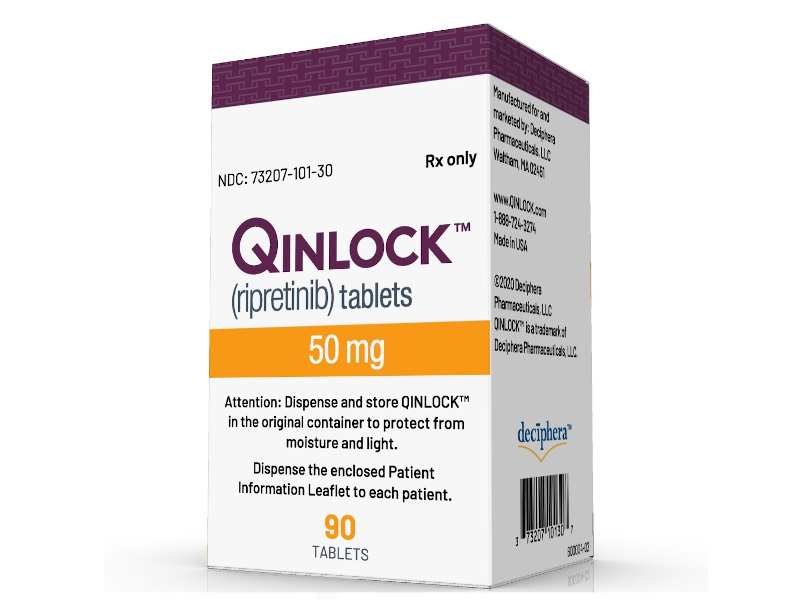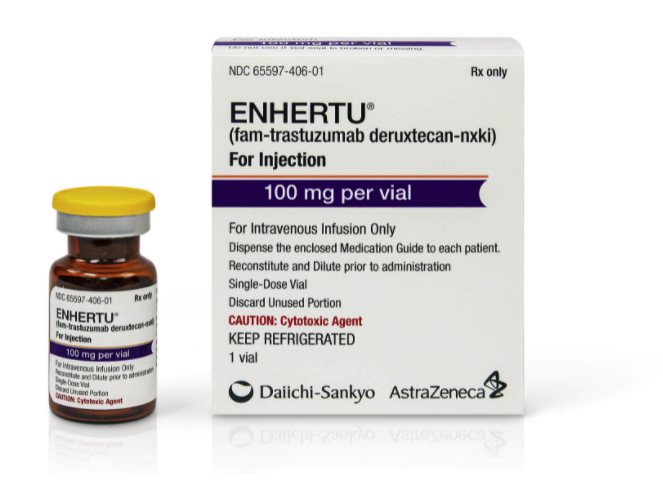Qinlock (ripretinib) vs Enhertu (fam-trastuzumab deruxtecan-nxki)
Qinlock (ripretinib) vs Enhertu (fam-trastuzumab deruxtecan-nxki)
Qinlock (ripretinib) is a kinase inhibitor specifically approved for the treatment of advanced gastrointestinal stromal tumors (GIST) in patients who have received prior treatment with 3 or more kinase inhibitors, including imatinib. Enhertu (fam-trastuzumab deruxtecan-nxki) is an antibody-drug conjugate indicated for the treatment of patients with unresectable or metastatic HER2-positive breast cancer who have received two or more prior anti-HER2-based regimens in the metastatic setting, and for HER2-positive gastric cancer in patients who have previously received a trastuzumab-based regimen. When deciding between these two medications, it is crucial to consider the specific type of cancer being treated, as Qinlock is tailored for GIST and Enhertu is designed for certain HER2-positive cancers, making them not interchangeable but rather specific to the cancer's molecular profile and previous treatments.
Difference between Qinlock and Enhertu
| Metric | Qinlock (ripretinib) | Enhertu (fam-trastuzumab deruxtecan-nxki) |
|---|---|---|
| Generic name | Ripretinib | Fam-trastuzumab deruxtecan-nxki |
| Indications | Advanced gastrointestinal stromal tumor (GIST) | HER2-positive breast cancer, HER2-positive gastric or gastroesophageal junction adenocarcinoma |
| Mechanism of action | Kinase inhibitor | HER2-directed antibody and topoisomerase inhibitor conjugate |
| Brand names | Qinlock | Enhertu |
| Administrative route | Oral | Intravenous |
| Side effects | Alopecia, fatigue, nausea, abdominal pain, constipation, myalgia, diarrhea, decreased appetite, palmar-plantar erythrodysesthesia syndrome, vomiting | Nausea, fatigue, vomiting, alopecia, constipation, decreased appetite, anemia, neutropenia, diarrhea, leukopenia, cough, dyspnea |
| Contraindications | None known | None known |
| Drug class | Tyrosine kinase inhibitor | Antibody-drug conjugate |
| Manufacturer | Deciphera Pharmaceuticals | Daiichi Sankyo and AstraZeneca |
Efficacy
Qinlock (ripretinib) and Gastric Cancer
Qinlock (ripretinib) is a kinase inhibitor initially approved by the U.S. Food and Drug Administration (FDA) for the treatment of advanced gastrointestinal stromal tumors (GIST) after prior treatment with 3 or more kinase inhibitors, including imatinib. While Qinlock has shown efficacy in GIST, its use in gastric cancer is not well established. As of the knowledge cutoff date, there are no clinical trials that have conclusively demonstrated the efficacy of Qinlock specifically for the treatment of gastric cancer. Therefore, its use in this context would be considered off-label, and the efficacy for gastric cancer cannot be verified without further clinical studies.
Enhertu (fam-trastuzumab deruxtecan-nxki) and Gastric Cancer
Enhertu (fam-trastuzumab deruxtecan-nxki) is an antibody-drug conjugate that combines a humanized anti-HER2 antibody with a topoisomerase inhibitor payload. It is approved for the treatment of adult patients with unresectable or metastatic HER2-positive breast cancer who have received two or more prior anti-HER2-based regimens. In the context of gastric cancer, Enhertu has shown promising results. The FDA granted approval for Enhertu for the treatment of adult patients with locally advanced or metastatic HER2-positive gastric or gastroesophageal junction (GEJ) adenocarcinoma who have received a prior trastuzumab-based regimen.
The approval of Enhertu for gastric cancer was based on the results of a multicenter, randomized, open-label, active-controlled trial. In this trial, patients treated with Enhertu demonstrated a significant improvement in overall survival and progression-free survival compared to patients who received chemotherapy. The efficacy of Enhertu in this patient population provides a new treatment option for those with advanced HER2-positive gastric or GEJ adenocarcinoma, addressing an important unmet medical need.
It is important to note that the use of Enhertu is specifically indicated for HER2-positive gastric cancer, and its efficacy in HER2-negative gastric cancer has not been established. As with any medication, the use of Enhertu should be based on an individual patient's clinical profile and in accordance with the prescribing information and relevant treatment guidelines. Healthcare providers should consider the evidence of efficacy, potential side effects, and individual patient factors when recommending Enhertu for gastric cancer patients.
Regulatory Agency Approvals
Qinlock
-
European Medical Agency (EMA), European Union

-
Food and Drug Administration (FDA), USA

-
Health Canada

-
Therapeutic Goods Administration (TGA), Australia

Enhertu
-
European Medical Agency (EMA), European Union

-
Food and Drug Administration (FDA), USA

-
Pharmaceuticals and Medical Devices Agency (PMDA), Japan

Access Qinlock or Enhertu today
If Qinlock or Enhertu are not approved or available in your country (e.g. due to supply issues), you can access them via Everyone.org.
How it works

Make an enquiry
Choose the medicine you want to buy, answer a couple of questions, and upload your prescription to speed things up. We’ll get back to you within 24 hours.


Make an enquiry
Choose the medicine you want to buy, answer a couple of questions, and upload your prescription to speed things up. We’ll get back to you within 24 hours.


Breeze through the paperwork
We'll guide you through the required documents for importing unapproved medicine, ensuring you have all the necessary information.


Get a personalized quote
We’ll prepare a quote for you, including medicine costs and any shipping, administrative, or import fees that may apply.


Receive your medicine
Accept the quote and we’ll handle the rest - sourcing and safely delivering your medicine.

Some text on this page has been automatically generated. Speak to your physician before you start a new treatment or medication.
Let's talk
If you have any questions, call us or send us a message through WhatsApp or email:
Contact us




